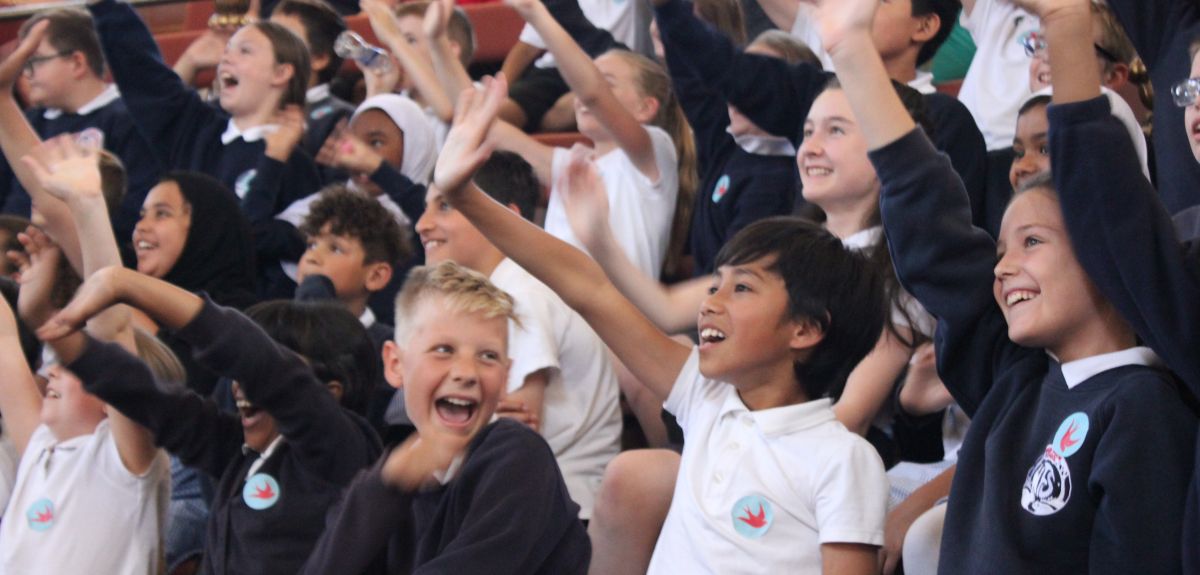
Image credit: Rob Judges
We Are Children of the World: celebrating Oxford’s linguistic diversity through song
Tomorrow (27 June), Creative Multilingualism, a research programme funded by the AHRC and led by the University of Oxford, will hold a concert with 500 local primary school children to shine a spotlight on the many languages spoken in Oxford’s schools and communities. Programme leader Professor Katrin Kohl explains what motivated this celebration of Oxford’s multilingualism.
Oxford is a multilingual city. In 2017, one third of all students in Oxford city schools had a language other than English as their first language. One secondary school in East Oxford has speakers of over 100 different languages. The value of these additional languages is not always recognised, and sometimes home or community languages are even seen as a handicap to learning.
Yet research findings show the opposite. Studies such as those conducted by Multilingual Manchester have shown that making the most of languages children speak alongside English improves their academic progress overall. By nurturing their pupils’ multilingualism, schools can also take advantage of the many benefits linguistic diversity brings, from interpersonal skills and enhanced communicative competence to cultural intelligence and open-mindedness.
Creative Multilingualism is investigating how linguistic diversity – including different languages, dialects and registers – interacts with creativity. Our team of researchers in Modern Languages, Linguistics, English, Media Studies, Education, Anthropology and Biology are finding out how our ability to use more than one language enhances the creative repertoire of both individuals and groups in expressing identities and communicating with others.
With this concert, we want to encourage bilingual and multilingual pupils to share their languages and cultures with their friends and classmates. We Are Children of the World, a choral piece composed by Lin Marsh, will feature folk songs in seven different languages which are commonly found in Oxford’s schools: Mandarin, Punjabi, Urdu, Arabic, Polish, Swahili and Portuguese. The composition follows the sun’s journey as it travels from east to west, starting in China with a song about the fragrant jasmine flower and finishing with a samba in Brazil.
The concert has been organised in partnership with the Oxford Festival of the Arts. Jon Cullen, Director of Music at Magdalen College School, took on the challenging task of teaching the piece to 500 pupils in ten different schools, including participation of the County Youth Junior Choir. He produced PowerPoint slides for each part of the composition which include audio recordings and videos of him and composer Lin Marsh singing the piece line by line alongside the musical score. He also provided each school with backing track, score and lyrics. He visited the schools with a team of staff and A-level students from Magdalen College School, who helped the students master the words of the composition.
Last week, the schools came together for the first time to rehearse as a choir of 500, accompanied by an orchestra. A show of hands at the lunch break showed that we had speakers of all the languages which feature in the composition. The rehearsal was tremendously inspiring and the participants enjoyed exploring different cultures and parts of the world through song.
The concert on 27 June at the Sheldonian Theatre will be the first ever public performance of We Are Children of the World, but we don’t want it to be the last. After the concert, we will be making the composition including musical score, lyrics and teaching resources freely available on our website. We hope that schools across the country and beyond will use the composition as a springboard for conversations about languages and cultures from different countries – and for multilingual fun with singing.